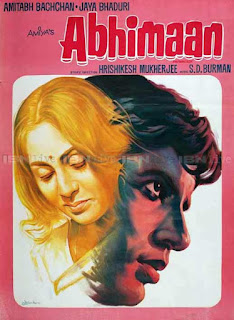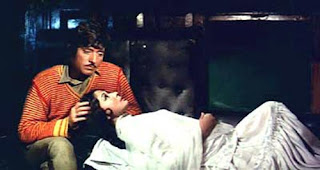The
battle of the sexes has been a subject of a number of interesting films. And it
becomes an even bigger battle if the protagonists in the battle happen to be
married. There is a lot of he-did-this and she-did-that which only further
complicates the matter and makes it impossible to actually apportion the
errors, if any in neat timelines. Actually, in most cases, the error is a mole
and the furore the mountain. Talk about
a mole in the mountain!
However,
only a few Hindi Films made on that subject have been able to stir both the
hearts and the minds of the populace, without severely the impacting the
bottom-line of the movie. A case can be made for Talaq (very few must have
actually heard about this Rajendra Kumar starrer), Dastak (a movie par
excellence), Kora Kaaghaz (Much about this milestone later on) and the Basu
Bhattacharya starrers, Anubhav and Avishkaar.
A
majority of the movies on this subject have almost the same incestuous plots (not
to do with incest per se but with the commonality of the plot) and the ever
same contrived endings. Very rarely does a movie made on this premise go deep
into the psyche of the characters and delve on the psychology of these
emotions. What is the reason for the discord? Why did he behave in this manner?
What was her justification? Did he mean what he say? Did she do what she did
for some ulterior motive? Who was responsible? Why did this happen? Questions
galore but most remain unanswered and what actually we see is the storm that
threatens the existence of the tea-cup, in this case marriage.
If
there was ever a movie which did complete justice to the concept without
sermonizing or taking sides, it had to be Hrishikesh Mukherjee’s great take on
the subject – Abhimaan – the surprise packet of 1973.
In a nut shell Abhimaan is the story of a couple whose family life falls apart due to the predominance of male ego over familial ties. The movie beautifully traces the growth of the monster of jealousy to its final metamorphosis in it’s all destructing avatar as the resultant male ego brooks no boundaries as it shatters all hopes of reconciliation and by the end of the movie one is forced to delve deep into one’s own self and find instances when one has also felt the pangs of male ego and there must have been many who must have observed the self-destructive ability of this abominable monster from close quarters.
This
is Amitabh at his vintage best. 1973 was finally the year Amitabh took off with
Abhimaan, Namak Haraam and Zanjeer highlighting the actor’s strong hold on
different aspects of performance.
 Jaya
Bhaduri nee Bachchan as Amitabh’s singer-wife, Uma is perfect. I have doubts
that any other actress would have been able to perform this role with the deft
maturity that it requires. As a wife,
trying her best to salvage her relationship with her husband, she is just
extraordinary. Unlike other actresses who would try to perform anguish with
dialogues or overdramatic gestures, Jaya displays all her anguish with her
silence and a look at her eyes in the course of the movie tells much more than
can ever be expressed by dialogues. In fact, the beauty of the movie lies in
the fact lies in the fact that it speaks more with silence and eyes than with
dialogues.
Jaya
Bhaduri nee Bachchan as Amitabh’s singer-wife, Uma is perfect. I have doubts
that any other actress would have been able to perform this role with the deft
maturity that it requires. As a wife,
trying her best to salvage her relationship with her husband, she is just
extraordinary. Unlike other actresses who would try to perform anguish with
dialogues or overdramatic gestures, Jaya displays all her anguish with her
silence and a look at her eyes in the course of the movie tells much more than
can ever be expressed by dialogues. In fact, the beauty of the movie lies in
the fact lies in the fact that it speaks more with silence and eyes than with
dialogues.
No wonder Jaya won her first Filmfare trophy for her subtle and strong, though understated performance in the movie. It was also the first time in the history of FilmFare that the trophy was divided among two female contenders - the other winner being Dimple Kapadia for her debut performance in Bobby.
Abhimaan
also boasts of memorable and impeccable performances by the supporting cast. Bindu
(in a rare positive outing), David Abraham, A K Hangal and Durga Khote all perform
their roles with consummate ease and perfect intonations. When I saw the movie for the first time in my childhood, I was surprised with the effortless with which Bindu managed a positive turn. I had sadly got used to the Hindi movie's penchant for typecasting good actors.
Asrani captures more
than our hearts in the role of a family friend who is a silent though unwilling
witness to the spiral down in the couple’s relations. In fact, the popular comedian was so convincing and subtle that he was nominated in the Best Supporting Actor Category for FimFare
awards for this performance. Unfortunately he didn't win the award (he lost to a brilliant performance by Amitabh Bachchan in Namak Haraam) but few can challenge his performance.
S
D Burman, as usual comes up trumps with songs that gel with the flow of the
story and also resonate with the mood of the movie. This album can be considered
without any objection to be among the top 10 musical scores ever in the history
of Hindi music. Such is the versatility of the composer that he composes tunes to the strength of every singer and at the same time keeps the mood of the movie within his firm grasp. From Pyaasa (1957) to Guide (1966) to Abhimaan (1973), he is indeed the doyen of Hindi Cinema.
Mohammed Rafi, Lata Mangeshkar, Kishore Kumar, and Manhar
Udhas, all score with their brilliance. Anuradha Paudwal, the top singer of the
late 80s and early 90s makes her debut in the Hindi film industry with the rendition of a shloka sung with
great fervour in this movie
 The
3 duets in the movie have each a life of their own. Whether it is “Loote Koi
Man Ka Dagar” with Manhar Udhas, “Tere Mere Milan Ki Ye Raina” with Kishore
Kumar or “Teri Bindiya Re” with Mohammed Rafi are all exceptional.
The
3 duets in the movie have each a life of their own. Whether it is “Loote Koi
Man Ka Dagar” with Manhar Udhas, “Tere Mere Milan Ki Ye Raina” with Kishore
Kumar or “Teri Bindiya Re” with Mohammed Rafi are all exceptional.
In fact,
“Teri Bindiya Re” is among my all-time favourite duets. Every Rafi-Lata duet
down the years is a special treat but this one is just in a class of its own.
Similarly, “Tere Mere Milan Ki Ye Raina” has a life of its own and I consider
this the best ever Kishore-Lata duet only next to the ones in Aandhi and Tere Mere Sapne.
Hrishikesh Mukherjee manages to hold our attention throughout the movie without
indulging into high theatrics and it’s to the credit to the talent of this
young director that such an intense movie does not look heavy duty. Maybe it is the dialogues by the great Rajinder Bedi that make the difference.
The
confrontations between Amitabh and Jaya and the final reconciliation (or should
I say redemption) is perfectly handled. So is the reaction of every friend and relative, keeping in view their seniority and their closeness well described. So Asrani, a friend reacts as friends do, while Durga reacts effeciently as an elder relative would. It is to the director's credit that there is no artificality in the movie or on the part of the characters.
His biggest plus point lies in the fact that the director presents every character as it is. There is no sermonizing or sloganeering involved. Nor is there any heavy-duty victimization or ruthless villainy. There are no antagonists but man and his deep-seated ego! Kudos to the director for ensuring that the movie doesn't take sides but at the same time doesn't bow down from making a telling point either.
Do
watch this movie if you are newly married, long since happily married or on the
verge of some major relationship break. Marriage is not a joke, at least not
one where personal egos should interfere. A Marriage is made of more than one
people; so it is imperative that personal ego should always take a backseat to
collective responsibility and trust among the stakeholders.
Think about it!

























